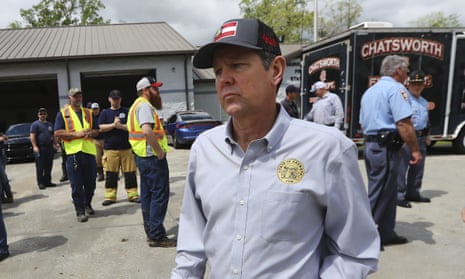Georgia mayors said they were alarmed by the governor’s decision to reopen the economy this week, as the state joined several others in planning to relax restrictions aimed at curbing the spread of Covid-19.
The mayor of Savannah called the decision “reckless, premature and dangerous”.
Ignoring public health experts’ warnings that reopening too quickly could cause another spike in cases, Georgia’s governor, Brian Kemp, a Republican, said on Monday some businesses in the state could reopen this week.
From Sunday to Monday evening, 86 people in Georgia died of Covid-19. There is no widespread testing for the virus in the state, which epidemiologists say is necessary for safe reopening.
The mayor of Atlanta, Georgia’s biggest city, said Kemp’s decision was not based on “anything logical”.
“We see our numbers are continuing to tick up in this state, we see that our deaths are rising,” said Keisha Lance Bottoms, a Democrat. “We have some of the highest asthma rates in the country right here in Atlanta.”
She later issued a statement insisting city residents stay inside.
The Democratic mayor of Savannah, Van Johnson, said ending the lockdown was “reckless, premature and dangerous”.
“People can see it for themselves,” Johnson told CNN. “We want them to keep the faith, but we want them to follow the science. This is still a dangerous time. This is not the time for people to take their feet off the gas.”
Kemp said businesses including bowling alleys, tattoo studios and hair salons would reopen this week if they met safety standards and enforced social distancing. Movie theaters and restaurants could reopen on Monday.
Georgia’s public health commissioner, Dr Kathleen Toomey, said emergency rooms were seeing fewer flu-like illnesses. She said the state would increase contact tracing, the practice of identifying people who have had close contact with someone who tests positive for Covid-19.
“We definitely have a plateauing and what appears to be a decline,” Toomey said.
In Albany, where nearly 100 people have died from Covid-19, Mayor Bo Dorough said the governor’s decision was irresponsible.
“I’m flabbergasted that the governor would say we can’t take additional precautions to protect our citizens,” Dorough told the Atlanta Journal-Constitution. “This isn’t a mixed signal. It’s a U-turn.”
Despite a number of small protests across the country calling for restaurants and stores to reopen, polling has shown a majority of Americans support stay-at-home orders.
Nearly 60% of voters say they are more concerned the US will move too quickly than that the restrictions will be in place too long, according to a national poll by NBC News and the Wall Street Journal published on Sunday.
Political leaders, including Donald Trump, say lockdowns must end to save the economy. Many business leaders have said stay-at-home orders are important for preserving their business.
On Tuesday, the South Carolina senator Lindsey Graham, a Republican, said he feared Georgia’s plans were too abrupt.
“I support what South Carolina Governor announced yesterday – a small reopening of our state’s economy with a focus on social distancing,” Graham tweeted. “I worry that our friends and neighbors in Georgia are going too fast too soon.”
In Brookhaven, Georgia, Mayor John Ernst told local news station 11 Alive the first text he received after the governor’s announcement was from a restaurant owner concerned reopening could hurt his business more than staying closed.
By opening back up, business owners could have to pay for staff and supplies while facing a trickle of customers who do not cover costs.
Owners are also left to decide whether they should open up in the face of public health experts advising against doing so. At the beginning of the outbreak, business owners’ concern about this responsibility being placed on them, instead of the government, prompted many to demand blanket stay-at-home orders.
The mayor of Tybee Island, Shirley Sessions, said: “I think it’s putting a lot of pressure and stress on the businesses.”
